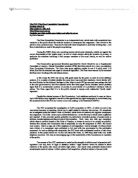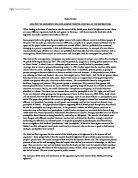There could have been no real public opinion on Watergate without the media. By reporting and even sponsoring polls the media presented the cast of political actors in Watergate and gave measure to the public response of every move they made.
Not all of the consequences for the US press post-Watergate have been seen as beneficial. Since Watergate, the Post has acquired a virtual monopoly over the Washington newspaper market, which has lowered the standard of journalism,
“…grown fat and – frankly – journalistically flabby. Its op-ed page is notable for its turgid prose, its conservative slant, and the apologetic tone of its more liberal contributors.”
Observers of the US press claims that Woodward and Bernstein may be to blame for “tedious journalism”, and that there is a post-Watergate phenomenon that the US press is now “So sober-sided and Serious with a capital S that is drained a lot of personality out the newspapers.”
The only hometown rival for the Post is the Washington Times, which is lacking in circulation power (100,000 v the Post’s 750,000).
Watergate greatly diminished the prestige of public office, creating, far beyond the US, scepticism about the integrity of great leaders. All of this has been commented on as nauseam, most recently during the Lewinsky affair. Watergate and Richard Nixon have become synonymous with scandal. These days, any scandalous misdeeds credited to a politician will be read against this generalized reputation of party politics. The press thrive on scandal, and now hesitate at nothing to tear apart even the most high ranking of political figures, leaving the public doubting heavily who, if anyone, they can really trust.
This social impact was noted by Charles O. Jones, a former president of the American Political Science Association.
“It [Watergate] sort of instructed us as to the potential for a kind of scandal that we hadn’t really imagined was possible before, because of some feeling that ‘Gee, that couldn’t happen – it’s the president of the United States we’re talking about’. Post-Watergate we come to believe that it could be as bad as we think.”
America and the rest of the Western, capitalist societies have endured numerous scandals in both politics and business and the public are now becoming more immune, and are hardly surprised when any new allegations are made. This then gives the public some form of pervasive cynicism that can make it quite difficult for scandals about politics or business to reach epic proportions. An example of this would be the Whitewater financial scandal that plagued the Clinton administration for years and had mass press coverage, yet did not in any way hinder him. Clinton had an overwhelming victory in 1996, and many Americans claimed not even to be bothered by the story.
Watergate put the question forward of press ethics, how far is too far? At the time the scandal was erupting the reporting of the Washington Post came under severe questioning by everyone. Katharine Graham, who was chairman of the executive committee and former publisher of The Washington Post, recalls the reaction of the public,
“Readers of the Post were writing in and accusing the Post of ulterior motives, bad journalism and lack of patriotism.”
However, recent discussion of the media and its morals, it has been argued that the communications media assume the societal role of “moral guardian, ever alert to new possibilities for concern and indignation.” The media scandal is one proven means to stimulate public outrage, and a motive for such activity can easily be put down to financial gain. The competition in the media market places is getting more and more frantic, and the bigger and more exclusive the scandal, the higher the corporate profit. The media scandal can sometimes represent the worst of yellow journalism.
Watergate did unleash in the press the popular opinion that a media scandal can also be a public forum for public awareness and debate of moral questions- issues that often have strong implications for public policy. It has been argued that a media scandal is in fact,
“ A modern day exercise of “Fourth-estate” responsibilities, wherein the press keeps close tabs on those on society who wield tremendous political, economic and cultural power.”
This links to the fact that Watergate, however much a “scandal”, was in fact a fantastic piece of vigorous investigative journalism that unveiled to the world lies and deceit that previously would never have dared be brought to attention by the press. As much as Watergate revealed the naked truth about Nixon and brought about a new era of press revelations, it also unearthed the press as a new form of power in society, something that could not be repressed or denied acknowledgment, even by Nixon himself.
“It was the system that has brought the facts to life….. a system that in this case had included a determined grand jury, honest prosecutors, a courageous judge, Judge Sirica, and a vigorous free press.”
Biblography
- Media Power, Professionals and Policies. Howard Tumbler.
- Old Media, New Media, Mass communications in the onformation age.
- Megamedia Shakeout. Kevin Maney.
- The Media and Entertainment Industries.
- Disconnected America – The consequences of Mass Media in a narcissistic World. Ed Shane.
- Media Power in Politics. Doris A. Graber.
- Media Scandals. Editied by James Lull and Stephen Hinerman.
- The Media in America. John Tebbel
- Inventing Reality. Michael Parenti.
- Getting the Connections Right. Jay Rosen.
- Mass Media in America. Don R. Pember
- Breaking the News. James Fallows.
- Do the Media Govern? Shanto Iyengar and Richard Reeves.
“Bushwacked”, Matthew Engel, The Guardian, Monday January 13th, 2003.
Tom Kunkel, Dean of Journalism at the University of Maryland.
Source – New York Times online.
Source, an article that was excerpted from the 1997 book “Personal History” by Katharine Graham.
McRobbie and Thornton 1995, source Media Scandals
Richard Nixon, source an article that was excerpted from the 1997 book “Personal History” by Katharine Graham







